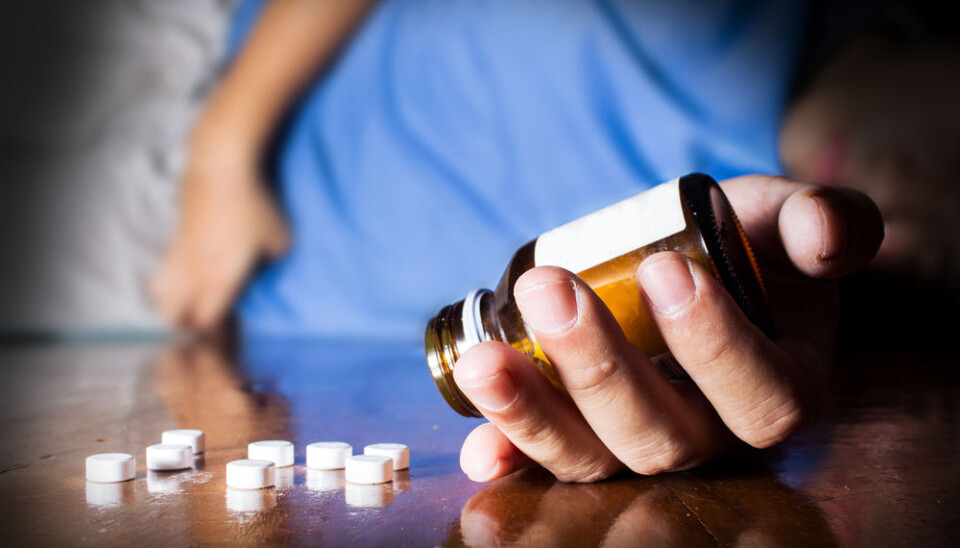
Depression patients experiment with their medicine
Half of all patients suffering from depression start experimenting with the medication during the first year of their treatment.
When Maria was discharged after three weeks of treatment at a psychiatric hospital she left with two things: the diagnosis depression and a cannister of pills that were supposed make her depression disappear.
In the beginning, she was petrified of forgetting to take a single pill.
"I felt like they were crucial to my very survival. I was really scared of feeling so terrible again," she explains.
So she took her antidepressants as prescribed by the doctor.
But as Maria gradually started feeling better she also started taking less and less medicine -- she acted on gut feeling, involving neither her family doctor nor her family.
And she is far from alone in doing so.
That’s the conclusion of a new study published in Social Science and Medicine which reveals that half of all patients on antidepressants will start experimenting with their medication at some stage.
Either by taking a smaller dosage, taking their pills at other times of the day than prescribed by the doctor, or quitting the medication altogether.
From restoration to frustration
The study followed 16 individuals diagnosed with depression for one year after they were discharged from a psychiatric unit in Region South, Denmark, and examined developments in their views on taking antidepressants. All the patients were followed by their own doctor after discharge.
The interviews revealed that depression patients typically undergo two phases during the first year of treatment.
To begin with, they all find themselves in a sort of restorative phase, during which they believe the medicine will help -- and they are terrified of falling ill again. During this phase, they take medicine as prescribed by their doctor.
As time goes by, however, an increasing number of patients reach a phase characterised by frustration caused by side-effects, ineffectiveness of the drug or a sense of still feeling ill. That’s when they take matters into their own hands and start experimenting with their medicine.
"They act intuitively, though more or less in the dark," says Niels Buus, Ph.D. and associate professor at the Department of Public Health at the University of Southern Denmark. “They may feel like the medicine makes them feel ill, but it’s really their depression that’s making them feel that way.”
Buus led the study and conducted the interviews with the depressive patients.
Patients abandon their doctor
About six months went by before Maria emerged from the restorative phase and started taking less and less medicine.
"It actually started by chance because I forgot to take my pills once in a while. So I thought that if nothing happened because I forgot to take them for one day, taking them made no difference,” says Maria. “I felt just as bad on the days when I took my pills as on those where I didn't.”
She said nothing to her doctor or her family. This is a very common behaviour, says Buus.
"Most patients actually did want to consult their doctor but as they gradually discovered that the doctor is unwilling to go along with their wishes, that is to step down or stop taking a drug entirely, then they start experimenting," he says.
It can be pretty dangerous. Some antidepressives leave the body quite quickly and patients who stop taking them risk relapsing into a deep depression. Although other drugs remain longer in the body, the risk of relapse is still high -- the process just takes longer.
Buus says it's really important that stepping down is done under medical supervision.
"People shouldn't experiment on their own. There’s no way they can interpret their symptoms correctly,” he says. “The doctor needs to be the expert who explains to them why they feel the way they do and supervises them so they don’t stop taking their drugs in a safe manner.”
Doctor must collaborate on depression
Poul Videbech, a professor of psychiatry at the Department of Clinical Medicine at Aarhus University, is not surprised that so many people start experimenting with their medication.
He thinks it’s a reaction to poor practice by doctors who think it’s enough to prescribe some pills.
"They [the patients] need much more than that,” says Videbech. “They need to talk about why they became ill in the first place, what it means for them right now and what the medicine actually does.”
At no time did Maria feel her doctor had these kind of conversations with her.
"I felt a bit like a number,” she says. “He didn't intervene, he just prescribed the pills and we never spoke of it again. I needed greater understanding. He should’ve shown actually interest and that we were on the same side in this battle.”
Videbech and Buus both believe doctors can do better when it comes to collaborating with depressive patients.
"If a patient insists on stopping they must do so under supervision. Some doctors take offense because they feel like their treatment has been rejected but they don’t have that liberty,” says Videbech. “We have an obligation to help the patient and if things aren't going well, we must be prepared to help.”
Time a limited resource
Bruno Melgaard Jensen, chair of the Danish Medical Association for General Practitioners, says he’s familiar with the challenge posed by patients who experiment with their medication.
"All types of patients will do this, not just those with depressions. When I experience an issue I try to arrange it so they come to me and discuss their medication more often," says Jensen.
He believes most general practitioners have the competence to handle the treatment of patients with depression.
"We come across depressive patients extremely frequently and we have the necessary skills set to take care of them. It's all about ensuring good contact and arranging with the patient that they will return, even though they haven't started feeling ill,” says Jensen. “But we don't have endless amounts of time and I can't simply set aside an hour for one patient –and I also need to balance my practice's economy.”
In Maria's case, withdrawal went smoothly. She is now well and medicine-free.
Maria wished to remain anonymous for the purpose of this article. Her identity is known to ScienceNordic.
----------------
Read the original story in Danish on Videnskab.dk
Translated by: Hugh Matthews











